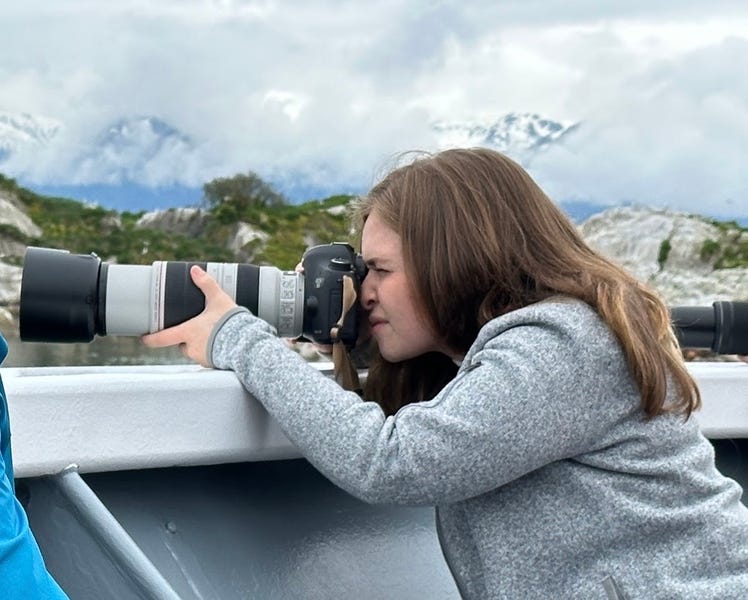✍️Science Writing News Roundup #208
Creating Your Own Podcast Production Network with Amy Westervelt + Usha Lee McFarling awarded 2024 Victor Cohn Prize.
Creating connection with science communication: Sophie Hartley wants to help people learn about the importance of natural resources and land management through science writing. (Photo courtesy of Sophie Hartley via MIT News.)
Welcome! You are reading the Science Writing News Roundup, a newsletter for science writers. You can also read this edition online. Did someone forward you this newsletter? Sign up here.
🖱️Articles
Facts alone fall short in correcting science misinformation: Just the facts may not be enough to overcome misinformation, a recent study indicates.
Overcoming AI’s diversity problem when creating images: It’s unclear how many freelance journalists or newsrooms are using AI-generated images, but in today’s era of shrinking news staffs and smaller budgets for photography or art departments, it’s an important issue for reporters and editors to note.
The actual writing part: What to do when you've once again fooled an editor into assigning you a story.
Storytelling in Science: Writing for Different Audiences & Making Your Research Memorable. This blog will explore various strategies and tools to help you become a more effective science communicator, ensuring your research has the impact it deserves.
Curiosity drives a science writing career: Siobhan Sanford’s career has been driven by her curiosity about the world and has led her to writing roles at scientific journals and pharma companies as well as full-time freelancing.
Steve Silberman (1957–2024), science writer and autism activist. Steve Silberman was an acclaimed author known for his award-winning science writing, musings on the music of the Grateful Dead, and acclaimed advocacy for the autistic and neurodivergent community.
More articles👉Bonus content for monthly supporters.
👩🔬Resources
The Fresh Paint Course: Learn how to build a business website that showcases your best work and attracts the clients you want.
Everything you need to know about the urban heat island effect: With 80% of Americans living in urban areas, understanding the heat island effect is crucial when reporting on environmental health as our climate gets hotter.
One Day Podcasting Course with Martin Redfern & Emma Brisdion: From recording your podcast to adding magic and marketing it, this highly practical one day course will enable you to create your own podcast.
More resources👉Bonus content for monthly supporters.
🚀Opportunities
A special Invitation to Indigenous journalists to apply for NASW travel grants to ScienceWriters2024 this fall. ScienceWriters2024 (#SciWri24) is an opportunity for Indigenous writers with an interest in writing about science, medicine, or the environment to connect with assigning editors, hone their craft, and learn about the latest advances in a wide variety of scientific disciplines.
More opportunities and calls for pitches👉Bonus content for monthly supporters.
📚News
Usha Lee McFarling awarded 2024 Victor Cohn Prize: Usha Lee McFarling, national science correspondent at STAT, has been selected to receive the 2024 Victor Cohn Prize for Excellence in Medical Science Reporting.
Introducing the Second Cohort of Ocean Reporting Fellows. The success of the first year of the Pulitzer Center’s ORN fellowship program, which provides the unique opportunity for freelance or staff journalists to spend a whole year pursuing an in-depth, investigative ocean story, resulted in a record number of applications for the second cohort.
NASW 2024 Idea Grant recipients will develop resources for first-generation college students aspiring to be science writers and for journalists reporting on lead in soil. The Grants Committee of the National Association of Science Writers has selected two proposals to receive its NASW Peggy Girshman Idea Grants for 2024.
🎧Videos & Podcasts
Science Journalism career panel with Nancy Averett (College Lecturer at University of Illinois Urbana-Champaign), Vivian La (Diverse Voices in Science Journalism Intern at Science Magazine), Christine Herman (Freelance editor and reporter), and Claudia Lutz (Outreach Manager at the Carl R. Woese Institute for Genomic Biology).
Writing for their Lives: In the 1920s, female writers pioneered the field of science writing for the mass market, making it their mission to help ordinary people understand everything from astronomy to venereal disease.
Creating Your Own Podcast Production Network with Amy Westervelt: Starting a new publication or production network has long been a big dream for many freelance journalists. Some have become disenfranchised with the status quo of how publications are run and are contemplating striking out on their own. Others see an opportunity to fill a niche that's been overlooked. But what does it take to bring a new media company from idea to execution?
More videos👉Bonus content for monthly supporters.
📆Events
Happy hour in Louisville, CO with the Science Writers Association of the Rocky Mountains (September 9, 2024)
Science essentials for news editors (September 18, 2024)
🎡Jobs
👉Bonus content for monthly supporters.
Thanks for reading! Subscribe for free to receive the next post in your inbox:
Worried you missed something? See previous posts here. What would you like to see in the newsletter? Please send me your suggestions: sciencewriting@substack.com



